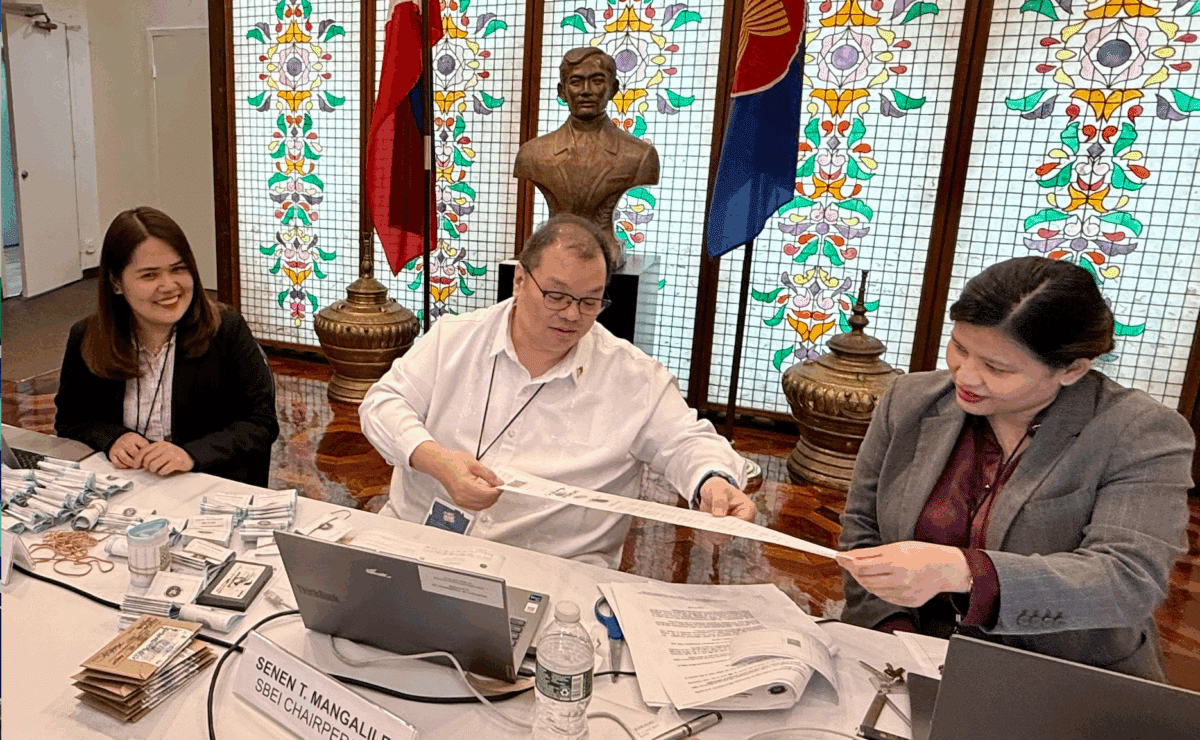‘Quite dismal’: Low turnout marks first overseas online voting in US

Consul General Senen Mangalile, chairperson of the Special Board of Election Inspectors, reviews the election tallies before transmitting the official results to the Philippine Embassy. Photo by Elton Lugay
NEW YORK — The Philippines’ first overseas online voting saw a record low turnout, with only 7.81 percent of registered Filipino voters in New York and neighboring areas casting ballots before polls closed at 7:15 a.m. EST on May 12.
Meanwhile, the Philippine Embassy in Washington, D.C., reported a 5.2 percent turnout among its 188,519 registered voters, with 9,806 participating in the midterm elections.
The United States is home to more than four million Filipinos, making overseas voting a significant opportunity for Filipino Americans to have a voice. In 2022, there were more than 1.6 million registered overseas Filipino voters in the US.
Ambassador Jose Manuel Romualdez has acknowledged the low turnout, describing it as “quite dismal.”
“I don’t know to what we can attribute this. Mostly because perhaps there’s a change in the way they’re voting,” Romualdez told ANC. “The information was not communicated enough.”
The online voting period, which began April 13, allowed voters to cast ballots remotely for over a month. Despite its historic significance, the low turnout highlights the ongoing challenge of engaging the Filipino American diaspora in Philippine elections.
In New York, approximately 2,500 of the 31,990 registered voters participated in the online election, which ran from April 13 through May 12. Consul General Senen Mangalile acknowledged the disappointing numbers but remained hopeful about future improvements.
“I am a bit disappointed with the turnout, but I believe this is just the beginning,” Mangalile told Inquirer.net USA. “We did our best to promote the system, and I hope more will participate in future elections.”
He emphasized the importance of ongoing outreach. “We need to educate our community about the convenience and significance of voting online,” he said. ” The more they understand and trust the system, the higher the participation will be.”
“Online voting can revolutionize how our community exercises their right to vote,” Mangalile added. “We’re committed to improving the system to make it more accessible and user-friendly.”
He said technical issues were encountered, especially regarding ID verification, with some voters unable to confirm their identities due to system requirements.
“We advised voters to contact us for assistance if they faced difficulties,” Mangalile said.
This election marked a historic milestone for Filipino Americans, who for the first time could vote online – eliminating the need to visit consulates or polling stations. The platform enabled voting via phones, laptops or desktops, increasing accessibility.
The Consulate’s efforts included opening the Philippine Center at 5 a.m. EST on election day, conducting outreach to states like Delaware and Maine, and partnering with Filipino organizations to raise awareness. Nonetheless, the low turnout underscores the need for better voter education and technical support.
Bam Aquino, Kiko Pangilinan lead the race
Meanwhile, in Washington, D.C., the Philippine Embassy announced the results of the online voting for the senatorial race. Leading the race was Bam Aquino, who received 5,269 votes out of the 9,806 total votes cast by Filipino Americans in the US, reflecting a clear preference among the overseas electorate.
Following Aquino were Kiko Pangilinan with 5,016 votes, Heidi Mendoza with 4,084, Bong Go with 4,057, Bato de la Rosa with 3,803, Rodante Marcoleta with 3,677, Ping Lacson with 3,343, Luke Espiritu with 3,044, Jimmy Bondoc with 3,005, Vic Rodriguez with 2,952, Raul Lambino with 2,685 and Teddy Casiño with 2,619.
Several high-profile personalities did not make the top 12, including actors Bong Revilla, Lito Lapid, and Philip Salvador, as well as boxing legend Manny Pacquiao and TV host Willie Revillame.
Apollo Quiboloy, who is currently on the FBI’s wanted list for multiple charges including sex and human trafficking, also did not make the cut.
The Embassy’s voter turnout was similarly low, with just over 5 percent participation relative to the total registered voters. This underscores ongoing challenges in mobilizing overseas Filipinos to participate in elections, despite the convenience of online voting.
Mangalile stressed the importance of continued efforts. “If we want higher participation, we need to keep improving our outreach and voter education. Every vote counts, especially from our large diaspora community here in the US.”
He also underscored the significance of voting: “Your voice matters. If you don’t participate, your influence on the future of the Philippines diminishes. We encourage everyone to stay informed and exercise their right to vote in future elections.”
Looking ahead, the consulate hopes online voting will become a permanent option. “There’s room for improvement, but the potential is great. We need to tweak the system to be more user-friendly and accessible. Eventually, people will get used to this mode of voting,” Mangalile said. “If you don’t use your right to vote, your voice won’t be heard in shaping our country’s future.”
Regarding US overseas turnout, Mangalile noted that unless other consulates see higher participation, the overall impact may remain limited.
“It’s up to overseas Filipinos to make their voices heard by voting. If they don’t, it won’t matter much compared to the large electorate in the Philippines. But if more overseas Filipinos vote, especially here in the US, their votes can have a significant impact.”
Mangalile also thanked community partners for spreading information about online voting and noted positive feedback from voters who registered and voted without issues.

